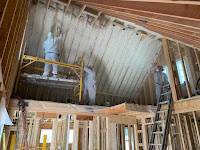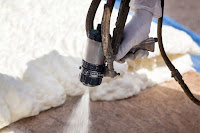Friday, July 14, 2023
What is R-Value Of Spray Foam Insulation?
Spray foam insulation has become a
popular choice for homeowners and businesses looking to improve their
energy efficiency and reduce heating and cooling costs. One of the key
factors that make spray foam insulation so effective is its high
R-value.
R-value is a measure of thermal resistance, indicating
how well an insulation material prevents the transfer of heat. The
higher the R-value, the better the insulation is at keeping heat in
during the winter and out during the summer. Spray foam insulation
boasts an impressive R-value, making it an excellent choice for those
seeking optimal thermal performance.
The
Open-cell spray foam insulation typically has an R-value of around 3.5 to 4 per inch. This means that a 2-inch layer of open-cell spray foam insulation will have an R-value of approximately 7 to 8. While open-cell spray foam has a slightly lower R-value compared to closed-cell, it still provides excellent insulation properties and can significantly improve the energy efficiency of a building.
Closed-cell spray foam insulation, on the other hand, offers an even higher R-value. It generally has an R-value of around 6 to 7 per inch, meaning that a 2-inch layer of closed-cell spray foam insulation will have an R-value of approximately 12 to 14. This higher R-value makes closed-cell spray foam insulation one of the most effective insulation materials available.

In
addition to its high R-value, spray foam insulation also provides other
benefits. One of the key advantages is its ability to create an airtight
seal when applied, preventing air leakage and minimizing drafts. This
not only improves energy efficiency but also enhances indoor comfort by
reducing temperature fluctuations.
Another benefit of spray foam
insulation is its ability to fill gaps and crevices, creating a seamless
barrier against moisture infiltration. This can help prevent the growth
of mold and mildew, which can be a significant concern in areas with
high humidity levels.
Furthermore, spray foam insulation offers
excellent soundproofing qualities. Its dense structure and ability to
absorb sound make it an effective solution for reducing noise
transmission, creating a quieter and more peaceful indoor environment.
When
considering spray foam insulation for your home or business, it's
important to consult with a professional insulation contractor to
determine the right type and thickness of spray foam for your specific
needs. They can assess factors such as climate, building design, and
budget to ensure you achieve the maximum benefits of the insulation.
In
conclusion, the high R-value of spray foam insulation makes it an
excellent choice for improved energy efficiency and reduced heating and
cooling costs. Whether you opt for open-cell or closed-cell spray foam,
both types provide exceptional insulation properties that can
significantly enhance the comfort and energy performance of your
building. So, if you're looking for a reliable and effective insulation
solution, consider spray foam insulation with its impressive R-value.
Forum Posts
-
Spray Foam Safety Guide Spray Polyurethane Foam Health & Safety Spray polyurethane foam (SPF) is a highly effective and widely ...
-
NCFI’s TerraThane Geotechnical Polyurethane Foam Systems 0 0 0 Prev Next What is it? TerraT...
-
Polyurethane Foam and Caulking Guns Subsidiary Opens in USA 0 0 1 Prev Next Irion Vertriebs GmbH, a German...
-
Polyurethane Foam ASTM Test Methods General Information about ASTM Test Methods for rigid polyurethane foam (ASTM D1621) Standard Te...
-
Exposure to SPF Chemicals Exposure Potentials of SPF Chemicals Chemical exposures from SPF can happen several ways, and there are ...
-
It doesn't matter if you're renovating or buying a house new, the insulation you choose matters more than you realize. ArmorFoam...
-
Spray-Foam Insulation Discover the advantages and disadvantages of spray polyurethane foam-- a high-performance material discovered in the w...










